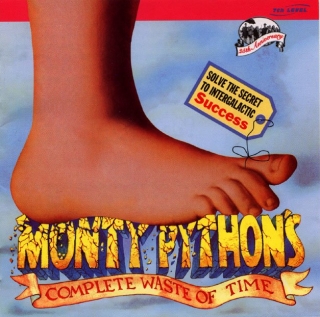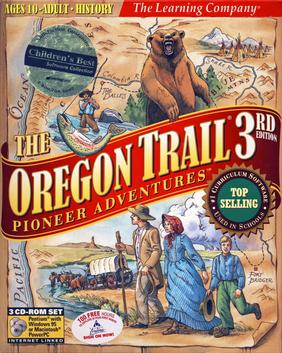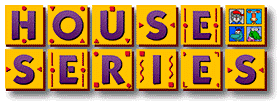
Starship Titanic is an adventure game developed by The Digital Village and published by Simon & Schuster Interactive. It was released in April 1998 for Microsoft Windows and in March 1999 for Apple Macintosh. The game takes place on the eponymous starship, which the player is tasked with repairing by locating the missing parts of its control system. The gameplay involves solving puzzles and speaking with the bots inside the ship. The game features a text parser similar to those of text adventure games with which the player can talk with characters.

JumpStart Games, Inc., formerly Knowledge Adventure, Inc., was an American edutainment video game company based in Torrance, California. Founded in 1991, it was acquired by Chinese holding company NetDragon Websoft in 2017.

Under a Killing Moon is a 1994 point-and-click adventure interactive movie video game. It is the third installment in the Tex Murphy series of adventure games produced by Access Software. In it, the detective Tex Murphy finds himself unwittingly involved in the affairs of a dangerous cult.

Amber: Journeys Beyond is an American computer game released in 1996 for Apple Macintosh computers and Windows 95. It is the only game produced by Hue Forest Entertainment, founded by Frank and Susan Wimmer.

Monty Python's Complete Waste of Time is a collection of minigames, screensavers, desktop wallpaper and icons for Mac OS System 7 and Windows released in 1994 by 7th Level, Inc. It was brought on board the Mir Space Station by astronaut Andy Thomas.

Star Wars: DroidWorks is a 1998 edutainment computer game and the premiere title from LucasArts subsidiary Lucas Learning. It uses the same engine as LucasArts' previous title Star Wars: Jedi Knight. The creators aimed to create a game that would be both appealing and nonviolent. The game's original release date was moved up by months, which resulted in the development team cutting some planned game features.

Humongous Entertainment, Inc. was an American video game developer based in Bothell, Washington. Founded in 1992, the company is best known for developing multiple edutainment franchises, most prominently Putt-Putt, Freddi Fish, Pajama Sam and Spy Fox, which, combined, sold over 15 million copies and earned more than 400 awards of excellence.

Carmen Sandiego is a media franchise based on a series of computer video games created by the American software company Broderbund. While the original 1985 Where in the World Is Carmen Sandiego? video game was classified as a "mystery exploration" series by creators and the media, the series would later be deemed edutainment when the games became unexpectedly popular in classrooms. The franchise centers around the fictional thieving villain of the same name, who is the ringleader of the criminal organization V.I.L.E.; the protagonists are agents of the ACME Detective Agency who try to thwart the crooks' plans to steal treasures from around the world, while the later ultimate goal is to capture Carmen Sandiego herself.

Dead Reefs is a game, developed by Canadian studio Streko-Graphics and published by The Adventure Company.
The Magic School Bus is a series of educational software video games developed by Music Pen and published by Microsoft via their Microsoft Home brand. The interactive adventures are part of the larger franchise and based with The Magic School Bus original series books and public television series.

The American Girls Premiere is an educational computer game developed and published by The Learning Company for American Girl. The game allows players to create theatrical productions featuring characters from American Girl's Historical collection, along with scenes and other elements unique to each of the girls' respective time periods.

Amazon Trail 3rd Edition: Rainforest Adventures is a 1998 game based on the video game The Oregon Trail. It is not a true sequel to the franchise, but is rather largely the same game as Amazon Trail II, only with updated graphics and interfaces and fixing major bugs that caused problems in the second game. The game is published by The Learning Company.

The Oregon Trail 3rd Edition is the second sequel to the 1985 edutainment video game The Oregon Trail after Oregon Trail II. It was developed by MECC and released in 1997.

Early Learning House or simply the House Series is a collection of four main educational video games and two compilations for the Windows and Macintosh platforms, developed by Theatrix Interactive, Inc. and published by Edmark software. Each different game focuses on a particular major learning category with selectable skill settings for preschooler, kindergarten and elementary learners. Millie's Math House (1992) on mathematics, Bailey's Book House (1993) on language, Sammy's Science House (1994) on science, and Trudy's Time and Place House (1995) on history and geography. A spin-off, Stanley's Sticker Stories (1996), sees players create animated storybooks with the series' characters. Millie & Bailey Preschool and Millie & Bailey Kindergarten each contain the combined activities from two of the four software products. In addition the programs can be configured by an adult mode to suit students with special needs. Most of the activities in every game have two modes, one to allow learners to explore and try it out for themselves and the other for learners to follow specific tasks set by the game characters. Learners also have the option to print pictures of creative activities and record sounds in phonics activities. Later the games were re-developed by Houghton Mifflin Harcourt Learning Technology and re-published by The Learning Company with newer graphics and additional activities.
The Arthur video games franchise was a series of learning and interactive story video games based on the American-Canadian children's TV show Arthur. The games were released in the 1990s and 2000s for PlayStation and Windows and Mac OS computers.

Thinkin' Things is a series of educational video games by the Edmark Corporation and released for Windows and Mac in the 1990s. Entries in the series include Thinkin' Things Collection 1 (Formerly Thinkin Things) (1993), Thinkin' Things Collection 2 (1994), Thinkin' Things Collection 3 (1995), the adventure game Thinkin' Things: Sky Island Mysteries (1998), Thinkin’ Things Galactic Brain Benders (1999), Thinkin' Things: All Around Frippletown (1999) and Thinkin' Things: Toony the Loon's Lagoon (1999).

Karma: Curse of the 12 Caves is a 1995 FMV adventure game. In 1998, DreamCatcher Interactive re-released the game as Quest for Karma. The game was released in Japan for PlayStation and Sega Saturn as Takuramakan.

D.A. Pursuit of Justice is a three-part video game series based around a criminal lawyer who is trying to convict guilty people. The three individual cases were sold separately or also as a three-case 8-CD bundle published by Alpha Software, shipped on September 15, 1997. The game is part of Legacy Software's RealPlay Series.

Smart Games Challenge is a video game series developed by American companies KnowWare and Smart Games. Three games were released between 1996 and 1998.
















